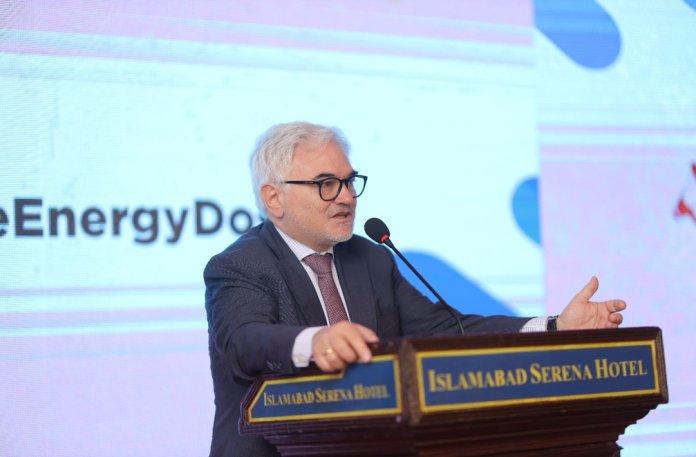By Adnan Rafique
ISLAMABAD: Ambassador, of the Federal Republic of Germany Alfred Grannas on Friday said Pakistan must take a more proactive approach to build its resilience against climate change and support communities more vulnerable to environmental degradation and adverse global warming impacts. The youth are the leaders of tomorrow and it was necessary to begin the change for their future.
He expressed these views during his keynote address at an event in connection with the International Youth Day organised by the Pakistan-German Climate and Energy Partnership (PGCEP), in collaboration with the Ministry of Climate Change and Environmental Coordination (MoCC).
The event, titled ” Youth 4 Climate Action: Young Voices, Bold Solutions,” was held here to harness the energy and creativity of young individuals towards addressing the pressing challenges posed by climate change under the auspices of GIZ (German Development Agency). The conference was a colorful convening that included panel discussions on pertinent topics and a theatre play by Loksath highlighting gender inequalities during climate crisis was showcased before the participants.
Ambassador Alfred Grannas said the conference was intended to address important youth role in climate action. He congratulated the MoCC and GIZ team for organising the event and said that the German mission would achieve meaningful results through Pakistani youth engagement in climate action.
“Climate Change is a global phenomenon and it affects the entire world. This event will provide Pakistani youth to imagine new ideas for addressing climate change,” he said.
He added that Germany has been a reliable partner of Pakistan and had a 60-year-old partnership which was strengthened through the iconic Pakistan-German Climate and Energy Partnership (PGCEP). Through the Pakistan- German Climate and Energy Partnership both the friendly countries were working on just energy transition and mitigation of environmental degradation and global warming impacts.
He added that Germany through the partnership was also assisting Pakistan to meet its national determined contributions (NDCs) pledged under the Paris Agreement. He mentioned that the devastating floods of 2022 inflicted unprecedented damage to various provinces of the country and it was yet not able to overcome the destruction as more monsoon rainfall started playing havoc in vulnerable areas.
“So far some $10 billion global funding has been extended to Pakistan and out of it $220 million alone has been given by Germany for flood disaster management. Around 500 million Euros project has been designed to address climate adaptation, mitigation and resilience of Pakistan,” he informed.
The German envoy told the participants that the first concrete approach on loss and damage fund at the COP-27 Sharm El-Sheikh was the result of a very good cooperation of MoCC and the German delegation led by Sherry Rehman the then Climate Change Minister of Pakistan and the German side represented by its Minister for Economic Cooperation and Development.
“We want to hear the voices of the youth that are neglected and it’s their voice that matters in the process of policymaking,” he said. A short documentary on projects supported by the German government and implemented by GIZ was also displayed during the conference.
Under the umbrella of Pakistan-Germany Climate and Energy Partnership climate change adaptation, mitigation and resilience and just energy transition were focussed areas. On the occasion, Additional Secretary MoCC Syed Mujtaba Hussain also delivered a keynote address. He said it was the convening of the future leaders of Pakistan and it was important to apprise the youth on a number of initiatives implemented by the MoCC during the climate journey of the country.
Hussain underlined that climate change was no longer a myth and it was here with full fury knocking everything out in its way. Pakistan had become the ground zero of climate change due to the frequent disasters and had faced 150 climate events in various forms and the recent monsoon 2022 monster floods and cyclone BIPARJOY caused 8% GDP loss to Pakistan and put it in recovery trap.
He added that for three consecutive years Pakistan underwent a continuous temperature rise and heatwaves in its south. He provided a detailed account of various initiatives including the National Adaptation Plan, National Clean Air Policy, National Hazardous Waste Management Policy, Single use plastics prohibition regulations, Living Indus Initiative, Recharge Pakistan, GLOF-II, REDD+, Pakistan Blue Carbon Ecosystems, Upscaling of Green Pakistan, and Snow Leopard protection project.
The Additional Secretary MoCC said the Snow Leopard conservation helped achieve a population increase of more than 200 snow leopards in GB, KP and AJK regions that were on the brink of extinction. He suggested that actions needed to be taken on a collective basis as the government, private sector and civil society would have to forge strong collaborations to cope with climate change challenges. “Youth have to take the process forward through their out-of-the-box thinking and innovative skills,” he added.




